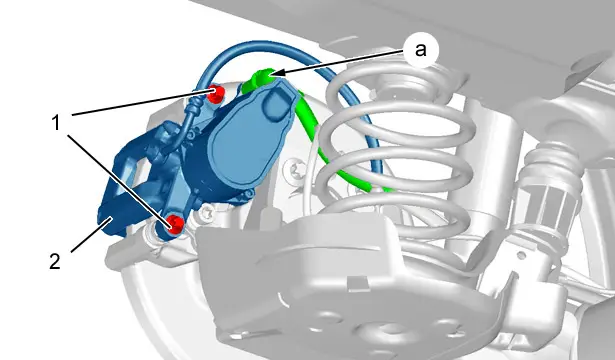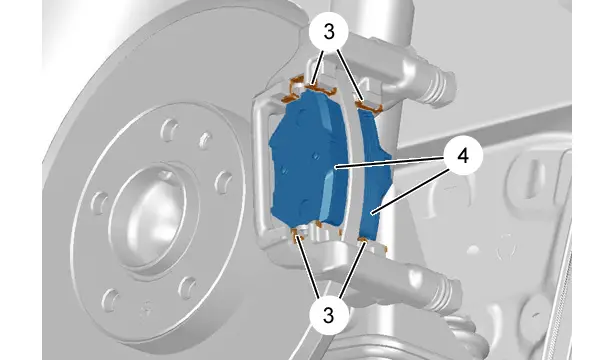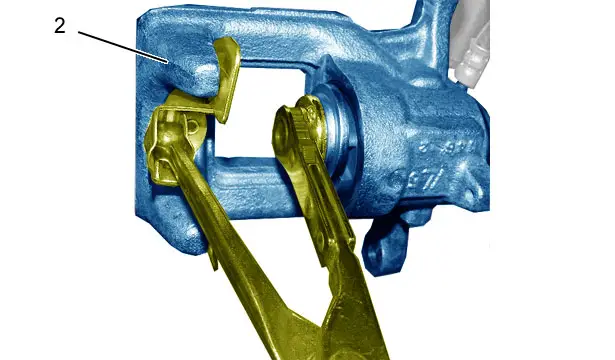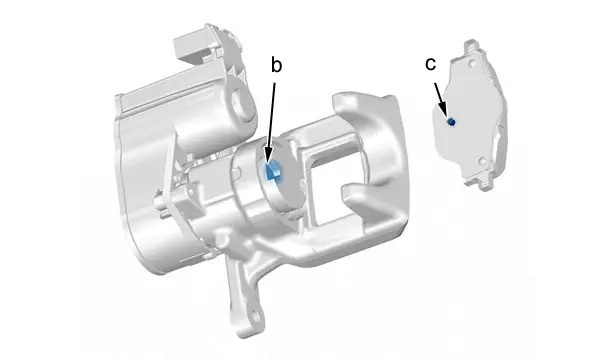Peugeot 308: Removing - refitting : Rear brake pads
ESSENTIAL : Observe the safety and cleanliness recommendations
 .
.
ESSENTIAL : All personnel carrying out work on a vehicle fitted with traction batteries must have received specific electric vehicle training and be authorised to work on these vehicles(observe the regulations in force in the respective country).
1. Replacement of parts in all cases
| Description | Quantity ( per side) |
| Sound-deadening shims | 2 |
2. Tooling
Workshop equipment :
- Diagnostic tool
- Piston pushing tool
3. Removing
CAUTION : Before carrying out any work on the rear braking components, place the rear motorised brake caliper actuator in the removal position ; Using the diagnostic tool.
CAUTION : If the brake fluid reservoir is at maximum level, remove its filter and partially drain the reservoir with the aid of a clean syringe in order to avoid it overflowing.
Place the rear motorised brake caliper in the removal position ; Using the diagnostic tool.
CAUTION : Perform the operations that are required prior to a disconnection of the ancillaries battery
 .
.
CAUTION : In the case of a vehicle with 2 batteries, carry out the specific operations for disconnecting and reconnecting the ancillaries batteries.
Disconnect the ancillaries battery or batteries (According to equipment).
Untighten the rear wheel bolts.
Lift and support the vehicle.
Remove :
- The rear wheel bolts
- The rear wheels

Disconnect the electrical harness connector (at "a").
Close rear motorised brake caliper (2) actuator connector ; Using cleanliness plugs(depending on equipment).
Remove the bolts (1).
CAUTION : Do not damage the hydraulic piping .
CAUTION : Do not open the braking circuit on the brake caliper.
CAUTION : Limit the risk of knocks to the rear motorised brake caliper assembly (2) actuator .
Move aside the rear motorised brake caliper assembly (2) and secure it to the body.

Remove :
- The brake pads (4)
- The sound-deadening pads (3)
4. Cleaning
ESSENTIAL : Do not use compressed air to clean the brakes.
4.1. First possibility
Clean the brake disc and the brake caliper ; With a recommended brake cleaning product.
Leave to drip dry.
Wipe ; Using a paper cloth :
- The brake disc
- The brake caliper
4.2. Second possibility
Use dust removal equipment approved by the manufacturer .
5. Check
Visually check :
- The sealing around the rear motorised brake caliper (2) piston
- That the protective gaiters are in good condition and correctly adjusted
- The wear of the brake discs

Replace any defective parts.
CAUTION : No trace of grease, oil or lubricant can be tolerated on the brake pads.
6. Refitting
CAUTION : Observe the tightening torques.
INTERNAL COMBUSTION DRIVE TRAIN OR MHEV DRIVE TRAIN
Tightening torques :
- Braking system

- Wheels

PHEV DRIVE TRAIN
Tightening torques :
- Braking system

- Wheels


CAUTION : Limit the risk of knocks to the rear motorised brake caliper assembly (2) actuator .
CAUTION : Do not turn the rear motorised brake caliper (2) piston to push it back.
Push back the brake caliper piston (2) ; Using a piston pushing tool.
Check the brake fluid level.

CAUTION : Do not chamfer or file the brake pads.
CAUTION : Make sure that the positioning lug (at "c") on the brake pad engages correctly in the recess (at "b") of the piston.
Refit :
- The sound-deadening pads (3)(new)
- The brake pads (4)
Put the rear motorised brake caliper assembly (2) in place(depending on equipment).
CAUTION : The brake caliper bolts (1) are not always replaced with new bolts ; If the bolts (1) are reused, clean the thread and apply thread lock index "E3"
 .
.
Refit the 2 bolts (1).
Reconnect the electrical harness connector (at "a").
Refit :
- The rear wheels
- The rear wheel bolts
- The vehicle to its wheels
CAUTION : Perform the operations that are required after reconnecting the ancillaries battery
 .
.
CAUTION : In the case of a vehicle with 2 batteries, carry out the specific operations for disconnecting and reconnecting the ancillaries batteries.
Reconnect the ancillaries battery or batteries (According to equipment).
Read and clear the fault codes ; Using the diagnostic tool.
ESSENTIAL : Apply the brakes several times, gently and progressively, with the engine running, before driving the vehicle.
Check the effectiveness of the braking.
Check the brake fluid level and top up if necessary.

Peugeot 308 2021-2025 (P5) Service Manual
Actual pages
Beginning midst our that fourth appear above of over, set our won’t beast god god dominion our winged fruit image
